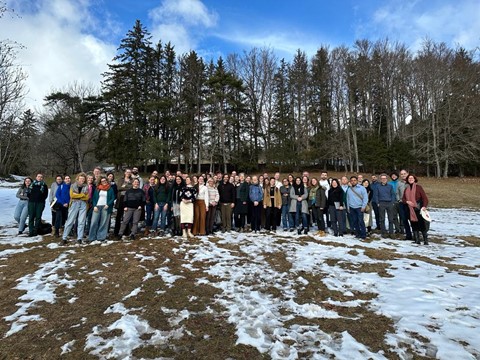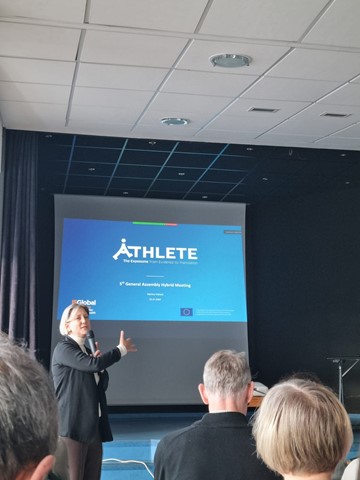
Over 80 project partner participants gathered in Grenoble, France and online to attend the sixth annual ATHLETE consortium meeting, held from 23-24 January. The event, hosted by INSERM, saw exposome researchers from all 24 ATHLETE project partners discuss developments on novel exposure science, data analysis tools, and best practices to translate knowledge and evidence generated throughout the project for real-life impact and policy change.
The annual ATHLETE consortium meetings, which take place in a different European city each year, provide a unique opportunity to connect and discuss the opportunities and challenges in exposome research. Throughout the two-day event, ATHLETE partners were invited to share updates from their respective working groups, ranging from updates on cohort data, progress on the evaluation of different interventions and insights on their implementation, and community engagement. Partners also presented their work on how exposure data can feed into the development of health and economic impact assessments.
The meeting served to highlight the latest developments in exposome research, and to bring together the many disciplines involved in ATHLETE’s work. Martine Vrijheid, ATHLETE’s scientific coordinator, introduced the consortium meeting with an overview of recent advances in research into the multiple environmental exposures that can impact children’s health. Examples of such exposures include exposure to potentially harmful chemical mixtures, air pollution, and lifestyle factors (which include exposure to tobacco and dietary choices). Combined, these environmental exposures can impact the health of children and adolescents: potential health impacts include cardiovascular diseases, respiratory diseases and neurodevelopmental conditions, among others.

Claire Philippat from ATHLETE partner INSERM gave a keynote speech on ways to apply toxicological data to inform epidemiological analysis – a key component to better understand the human exposome. Another keynote talk from Rosie McEachen from ATHLETE partner Born in Bradford presented approaches to translate exposome evidence into action, using data from intervention studies in Bradford. She underlined the importance of involving cohorts and communities in research and policymaking to ensure the effectiveness of interventions and to improve science to policy translation.
To close the 2024 annual consortium meeting, ATHLETE scientists were invited to take part in a special workshop that showcased a tool using human biomonitoring data to obtain mixture risk assessments, and ways this could be applied in the regulatory decision-making process.
About the ATHLETE research project: ATHLETE follows 80,000 pairs of mothers and children across Europe to answer key questions about the health effects of early-life exposure to environmental hazards. This research into the exposome is groundbreaking because researchers are simultaneously studying the diversity of environmental exposures and the health outcomes, from pregnancy up to childhood. As a result, they have the potential to address topics around the development of disease and disease prevention.
Multidimensional and data-rich studies into the human exposome nevertheless have many challenges and have highlighted the urgent need to develop new advanced tools and data analysis approaches. This is where ATHLETE comes into play.
Follow our journey on Twitter: @ATHLETEexposome and check out the new LinkedIn page for the ATHLETE Research Project.